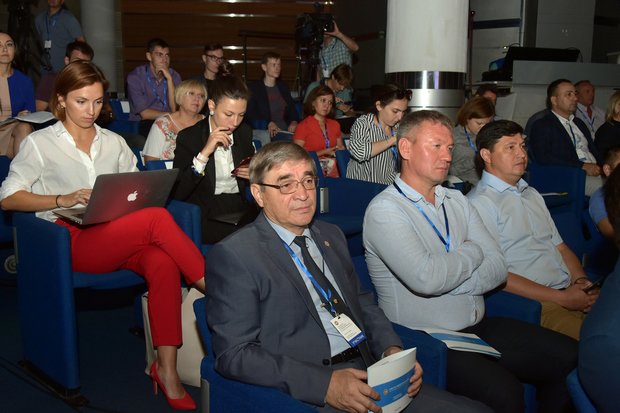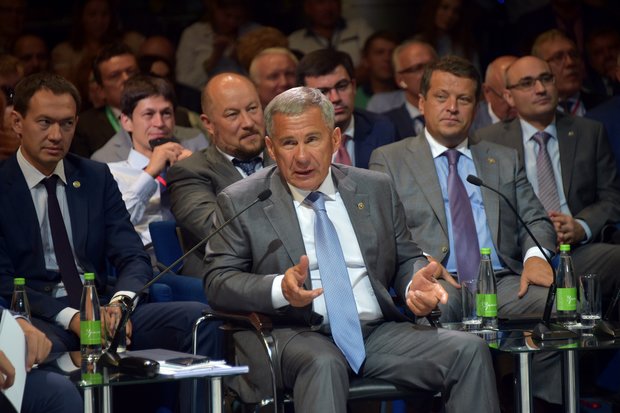Timur Nagumanov: ''The activity and moods of enterprises in Tatarstan have fallen heavily''
A fall in business activity was noted at the Entrepreneurship Council under the Tatarstan President
The level of business activity and enterprises' mood are falling in Tatarstan: more companies are reporting on shutdown and a drop in revenues, while the number of those who expect improvements in the future is reducing. Tatarstan Business Ombudsman Timur Nagumanov's team came to such sad conclusions. Entrepreneurs' surveys showed the climate and moods had decreased in most part of the republic. Realnoe Vremya tells the details.
Neither activity nor mood
Tatarstan Business Ombudsman Timur Nagumanov drew conclusions of the business climate in the republic at the ninth expanded session of the Entrepreneurship Council on 15 August.
It's the second research of this kind – the results of the first one were presented in October 2017 and caused a lot of criticism from regional leaders. The research was conducted by the Entrepreneurship Council together with Ak Bars Bank. A method of the international company Magram Market Research was used as the basis, which, Nagumanov said, ''didn't raise doubts''.
The evaluation of districts consisted of entrepreneurs' replies who were offered to answer the questions about business activity and moods. 100 respondents took part in surveys in every district, plus 2,100 entrepreneurs in Naberezhnye Chelny and 2,600 in Kazan. 69% of the companies that participated in the research come from small businesses, 11% were big enterprises. The respondents had also different businesses: 40% are services, 34% – trade, 26% – production. According to Nagumanov, such a selection reflects the real structure of the economy.
The researchers found two indexes – business activity and moods – in the entrepreneurs' replies. The first one shows the real state of affairs in the level of revenues, investments, dynamics of the personnel number, attraction of external financing. The second index demonstrates how businesses evaluate the conditions they work in and what they expected from the future.

In both cases, the index that's higher than 50 shows the situation is getting worse. 45-50 points mean stagnation: it's been neither better nor worse. Finally, the indicator under 50 speaks of the worsening situation.
''Our rating can be called a subjective evaluation of a business,'' said Nagumanov. ''We just tried to understand, firstly, what an entrepreneur answered our questions. Secondly, we asked how his business was: if it was developing, reducing, if he planned to hire employees, earn revenue if he got it.''
''Businesspeople already don't want to either take out loans or hire staff''
The conclusions the business ombudsman's team came to were by far sadder than last year: ''Unfortunately, both the activity and moods of enterprises have fallen heavily, and we see this bad negative trend. We forecast the trend will keep on,'' said Nagumanov.
Entrepreneurs have started to evaluate the situation better since last year's research only in five districts: Buinsk, Aksubayevo, Zainsk, Tukay and Nizhnekamsk. Moods of the enterprises in all others municipalities have worsened. In general, the index of moods in the republic has decreased to 37 (-6 points). The biggest fall has been in Aznakayevo (-22), Chistopol (-16,5), Sarmanovo (-14,9) and Aktanysh (-14,8) Districts.
More than half of the respondents (52%) claimed in the surveys the conditions to run a business had worsened in recent time. Last year, there were fewer entrepreneurs who thought so – 42%. According to Nagumanov, other research detects analogous negative opinions at the federal level too.
''We don't hide detected problems but quickly find ways to solve them. It's the job of the Tatarstan Entrepreneurship Council and personally mine as an ombudsman on the protection of entrepreneurs' rights under the Tatarstan president,'' said Nagumanov.
The business activity in Tatarstan is also in decline: its index has decreased from last year's 48 to 43 points, according to the current survey. So that the index has fallen below 45 points means ''now businesses aren't in a very good state,'' Nagumanov stated.

More negative dynamics were observed in Bavly (-11,6 points) and Baltasi (-10,3) Districts, while entrepreneurs noted a better situation in Nizhnekamsk, Kamskoye Ustiye and Muslyumovo Districts. The absolute highest business activity indexes (more than 50 poitns) have been given to Atninsk, Novosheshminsk, Muslyumovo, Kukmor and Tyulyachi Districts; the worst situation is in Apastovo, Aznakayevo and Sarmanovo Districts.
At the same time, the research's authors think the reduction in Tatarstan will keep in the next 6 months too. As a result, the index will be 37 points in 2019. ''This means the number of companies closing their business, reducing the staff can exceed the number of those that develop. And it's already quite a critical situation,'' the ombudsman claimed.
The capital of Tatarstan whose business activity has also decreased but not significantly (-4,4 points) occupies an important place in the general index. In Kazan, businesses operated in a greater competition and are less dependent on power, Nagumanov noted. During the surveys, the entrepreneurs told about growth in revenue and expectations of its rise. The main problem for businesses in the city is the low availability of financing – 58% of respondents mentioned it. However, as Nagumanov thinks, this isn't so bad: ''Businesspeople in other districts already don't want to either take out loans or hire staff.''
Fewer businesspeople complain about fines
What's more, the surveys have shown a reduction in administrative barriers: of 59% of enterprises told about inspections it last year, now they total just 51%. However, Nagumanov thinks it's early to be glad because ''the number is still big''. In absolute numbers, it's about 84% cases, which twice more than the official statistics of inspections according to the federal law on protection of juridical persons and individual entrepreneurs' rights. The explanation is that entrepreneurs don't care who checks them and why. As a rule, this is all a negative experience for them. Today inspections are more often carried out by the Federal Service for the Oversight of Consumer Protection and Welfare, then it's the State Fire Service and ecologists.
At the same time, there is a positive tendency too: the number of entrepreneurs who complain about high fines has suddenly reduced. Last year, they amounted to 42%, now – it's 24%. Inspectors started to just warn in the first breach, it's influenced.

In general, problems with product sales, which is mentioned by 28% of entrepreneurs, is the main obstacle to businesses. 15% of respondents noted difficulties with borrowing money, 14% say there is a deficit of staff and laws aren't perfect.
The general emotions of the business ombudsman of the research's results are that ''today we're not in a very good situation.'' Remembering the discontent that was caused by the last survey among some people, Nagumanov noted: ''Someone is immediately offended, they try to accuse us of incompetence, that we surveyed two people in the market. But someone, on the contrary, starts to constructively work with these numbers. Actually, it's what your businesspeople say,'' he addressed the heads of municipalities.
''The Tatarstan Entrepreneurship Council is held to discuss current problems and look for solutions together every quarter and in open talk,'' Nagumanov emphasised.
Tatarstan President Rustam Minnikhanov expressed himself in a similar way: ''I offer not to discuss how true it is. It can be emotions. If 100 people said something that's not very positive, it's not two people, it means there are some problems. These data must be taken into consideration. If people said, it means something is wrong there. It's very good if it's a mistake or some one-off moods of businesses.''